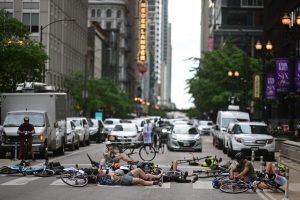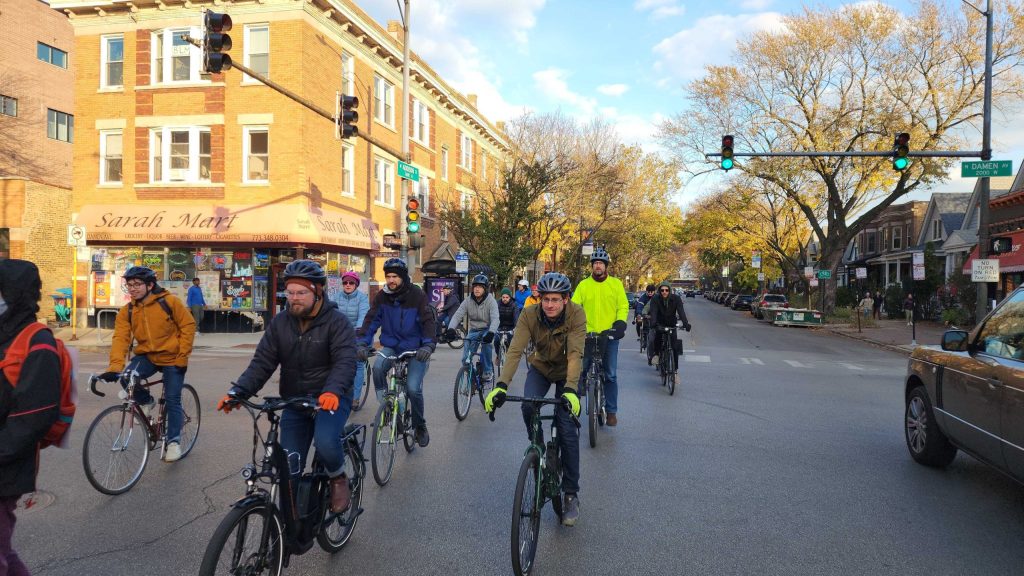Creating bicycle friendly infrastructure can often take years due to a lack of political will, scarcity of funding and frustrating government bureaucracy. But it doesn’t have to be that convoluted, according to Chicago, Bike Grid Now! The bicycle advocacy group is pushing for bicycle friendly, traffic-calmed streets that it says can be achieved sooner rather than later with minimal effort.
Active Transportation Alliance recognized the impact that Chicago Bike Grid Now! has made in shining a light on the need for safer streets and successfully mobilizing residents to its cause by honoring the group with its Advocate of the Year Award at Active Trans’ annual member meeting in December.
Chicago, Bike Grid Now! is advocating for 10 percent of Chicago streets to be prioritized for bicycles—that equates to 450 miles. Chicago has 4,500 miles of streets, but only 28 miles have protected bike lanes.
“We think 10% [of streets] that are bike-prioritized is totally reasonable, and it should be citywide,” says Nate Hutcheson, co-founder of Chicago, Bike Grid Now! “We don’t plow our streets on a ward-by-ward basis. We shouldn’t provide bike infrastructure that way either. And we shouldn’t accept that as an excuse from Mayor [Lori Lightfoot] that says, ‘The alderman has to be on board.’ Do the aldermen want their streets plowed? Then the aldermen need to have bike infrastructure [for their wards], too.”
MINIMAL FUNDING, MINIMAL EFFORTS
Chicago, Bike Grid Now! wants the city to create a network of low-stress bike-friendly streets with temporary infrastructure that can be implemented quickly with a small investment. The group is asking city officials to create a 10 mph speed limit for cars mostly on residential streets and short segments of commercial streets as needed. It wants pedestrians, wheelchairs, scooters, and cyclists to have the right of way on these streets. In addition, Chicago, Bike Grid Now! is requesting that the city implement signage and other road markings for these streets, too.
The advocacy group wants the city to eventually follow up with permanent infrastructure, including planters, jersey barriers, traffic diverters, chicanes, curbs, and bumpouts.
“The idea is we create some streets that are safe without a huge expense, and we can do that in a matter of weeks or months, not years or decades or generations,” Hutcheson explains. “So it’s all very doable. It’s just a matter of getting [the Chicago Department of Transportation] and leadership to understand that the current playbook isn’t working. We need to create something now that protects people and makes it safe to get around the city, and then improve it over time.”
Hutcheson co-founded Chicago, Bike Grid Now! in June 2022. He helped to create the upstart pro-bike organization because city officials lack urgency to create connected bicycling infrastructure in Chicago, he says.
“It was actually really out of frustration, and the fact that I just had this growing sense that advocacy in the traditional sense was not working,” Hutcheson explains. “The playbook of having to build protected bike lanes and wait for incremental progress is just not sufficient. It’s not going to get us where we need to go.”

CREATING TRAFFIC JAMS
To bring awareness to the lack of safe, bicycle friendly streets, Chicago, Bike Grid Now! hosts Bike Jams, a group ride that cycles slowly at 3 to 4 mph to intentionally delay motorists. The group usually holds the Bike Jams in neighborhoods where it would like to see better bicycling infrastructure implemented. It coordinates the Bike Jams by partnering with local community organizations to help publicize the rides and reaching out to the alderpersons who represent those neighborhoods, giving them the opportunity to speak to their constituents about what they will do to make the streets safer for bicyclists and pedestrians.
“It’s a good-natured protest, and we’re just trying to get the attention of city leaders and convert some of the people in the neighborhood along the way, whether they’re drivers or pedestrians or other cyclists,” Hutcheson says.
Last year Chicago, Bike Grid Now! also held Bike Jams once a month when the Chicago City Council met. The cyclists in the Bike Jam circled City Hall a few times and then sat in the middle of the streets in front of the building to block traffic, chanting for the need for bicycling infrastructure. Each sit-in protest lasted about five minutes before the police arrived and asked them to leave, which they complied with.
“The idea was to be as visible as we can for City Council and the mayor,” Hutcheson says. “That’s an important part of our work — making sure we connect that form of protest with the seat of power and who we want to influence. And we need to do more of that. We need to be louder, we need to be more visible, and we’ll be out there again this spring.”
SAFER TOGETHER
Chicago, Bike Grid Now! also hosts Bike Buses, in which bicyclists ride together in a group to provide safety in numbers, picking up other cyclists along the way like a bus. The rides take place every Wednesday during the morning rush hour for those cyclists commuting to work downtown. Cyclists join the bike buses along three routes: North Halsted Street, South Halsted Street and Milwaukee Avenue. Riding at 10 mph, the cyclists form a bus-shaped block, taking up an entire street lane, instead of a bike lane. Cyclists join the rides at certain stops. Chicago, Bike Grid Now! posts the routes and has a Bike Bus tracker that lets cyclists know when the bike buses will arrive at the various stops.
“It’s a little bit of a protest in that we’re out and pretty visible on the streets, but it’s also a way to show people how it feels to bike safely across the city and create the grid that we want to see everywhere someday in three places at one time,” says Daniel Streicher, a leader and organizer for Chicago, Bike Grid Now!
PROUD MOMENTS
While Chicago, Bike Grid Now! has only been up and running for less than a year, the scrappy organization has already made an impact. For example, it organized Jamapalooza on World Bicycle Day on Sept. 22, 2022, in which Bike Jam rides from all over the city culminated into an epic citywide bicycle meetup downtown. The group organized Bike Jams in Hyde Park, Bridgeport, Pilsen, West Loop, Wicker Park, and Lincoln Park with about 200 cyclists converging in The Loop. They blocked traffic along the way to bring awareness to the need for safe bicycling infrastructure while showcasing the growing Chicago, Bike Grid Now! community.
“That was an amazing moment, just to see so many people taking the streets for safe streets and bike infrastructure,” Streicher says.
“We even shut down Lake Shore Drive for a few minutes with hundreds of people,” he adds.
Chicago, Bike Grid Now! is also proud to be a part of the Safe Streets for All Coalition, a group of sustainable transportation groups that have joined forces to amplify their call for transportation equity, affordable housing and climate action. Active Transportation Alliance is a member of the coalition.
In addition, Chicago, Bike Grid Now! is also working with Illinois lawmakers to introduce legislation that would allow Chicago to lower the speed limit on bike-prioritized side streets to 10 mph. Hutcheson says he expects the bill to be introduced in the General Assembly in February.
While these wins are important, Hutcheson is particularly pleased with how much Chicago, Bike Grid Now! has grown in membership and influence in such a short amount of time. “It’s been really powerful to see the size and strength of our support increased, both people that have come on board to join Bike Grid Now and do this work, and then also outside in the city for safer streets,” Hutcheson says. “I think we’ve made a lot of allies, we’re educating a lot of elected officials, and hoping to hold those people accountable.”
“I’m most proud that we’ve created a way for all the people out there that are frustrated with the current infrastructure and the lack of progress and created an easy way for them to get involved. And it’s very accessible, and a lot of people have been able to join,” he adds. “That to me is the greatest thing — that we’ve empowered people to do something other than sign a petition. We’re giving people a taste of actual direct action, civil disobedience, civic engagement, and just empowering people. That’s a great thing we have built. We want the bike grid this year, but I’m most proud of the vehicle we’ve created to get there.”
Photos courtesy of Chicago, Bike Grid Now!
Top photo: Chicago, Bike Grid Now! hosts Bike Buses every week, in which bicyclists ride together in a group to provide safety in numbers, picking up other cyclists along the way like a bus.
Bottom photo: Last year Chicago, Bike Grid Now! held Bike Jams once a month when the Chicago City Council met. The cyclists circled City Hall a few times and then sat in the middle of the streets in front of the building to block traffic.

